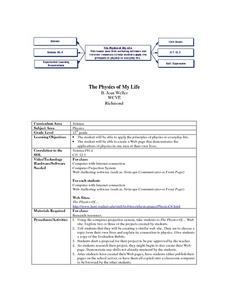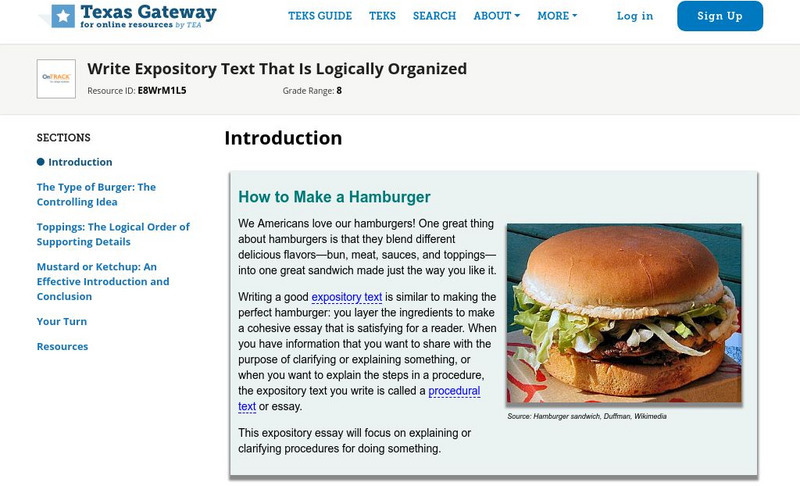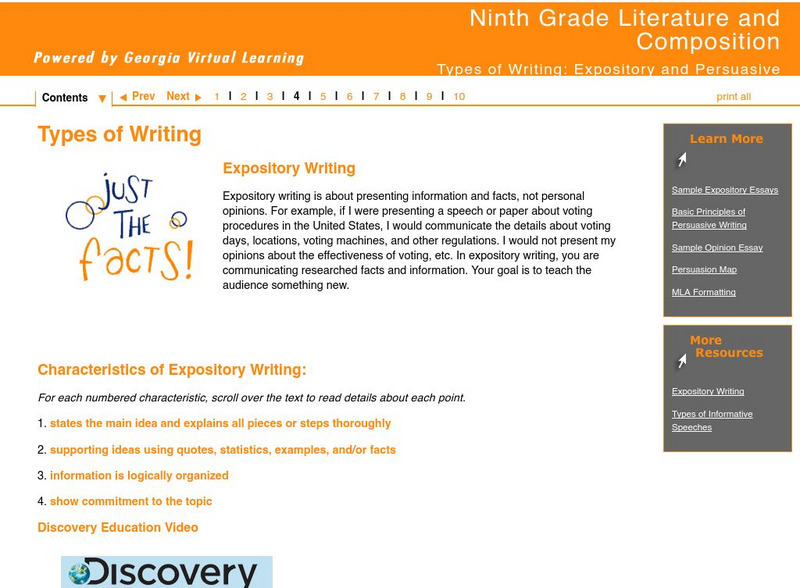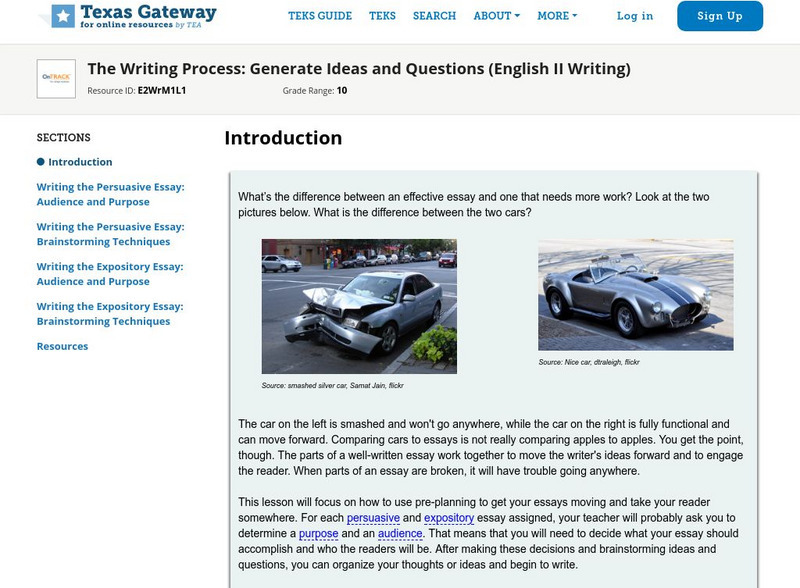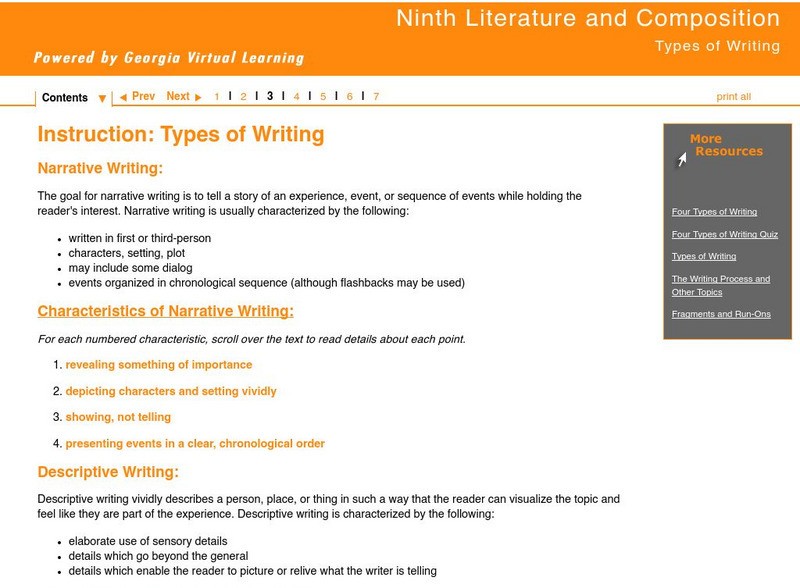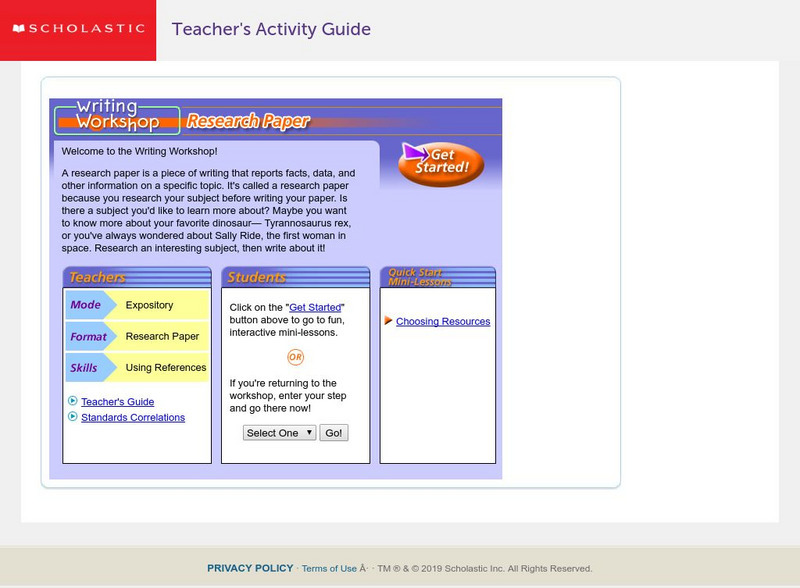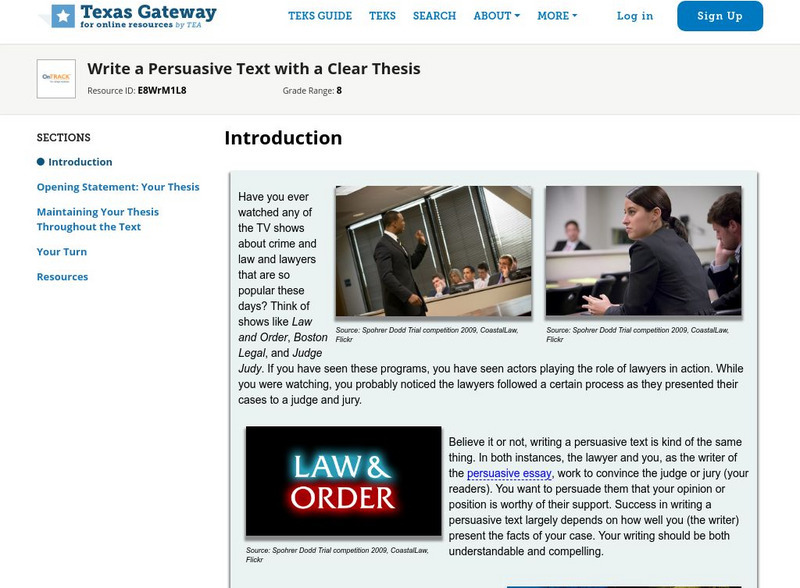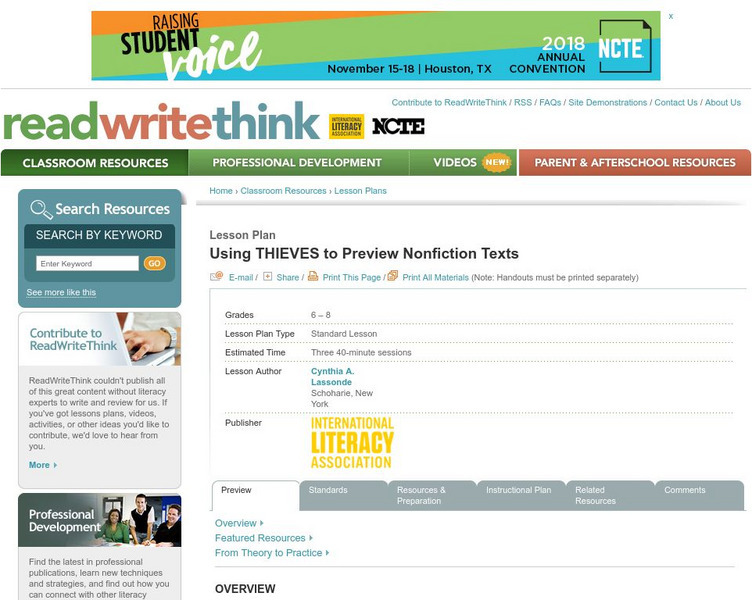Curated OER
Kirk Medical School
Fifth graders conduct research on the major organ systems of the human body. They create and present 3D models of a body system, and collect basic first-aid supplies for donation to a third-world community.
Curated OER
The Physics of My Life
Twelfth graders review the basic principles of physics. In groups, they use these principles to discover how they are present in their everyday lives. They create a webpage that demonstrates on of the principles and share it with the class.
Georgia Department of Education
Ga Virtual Learning: Types of Writing: Expository and Persuasive
This lesson introduces two types of writing: expository and persuasive. It defines and provides examples of each kind. It offers links to MLA Formatting and Style Guide and sample papers of opinion and exository essays.
Texas Education Agency
Texas Gateway: Write Expository Text That Is Logically Organized
[Accessible by TX Educators. Free Registration/Login Required] A learning module that teaches students how to write an organized expository text in five lessons: Introduction, The Type of Burger: The Controlling Idea, Toppings: The...
Texas Education Agency
Texas Gateway: Write Expository Text That Synthesizes Ideas
[Accessible by TX Educators. Free Registration/Login Required] A learning module that teaches students how to bring ideas together in an expository text in four lessons: Introduction, Analyzing Our Sources, Pulling Out the Major Points...
Georgia Department of Education
Ga Virtual Learning: Types of Writing: Expository Writing
This lesson focuses on expository writing including definition and characteristics. It provides links to the Discovery Education video: "An Unsinkable Essay," "Expository Essays," "What is Expository Writing?" "Types of Informative...
Other
Mo Dept. Of Ed.: Writing Essays (Expository) (Lesson)
Lesson plan designed for seventh graders. Students write expository essays that include details, facts, and examples. Includes prewriting handouts, some example paragraphs, some example prompts, and a scoring guide.
Georgia Department of Education
Ga Virtual Learning: Popular Culture: Expository Writing
This lesson focuses on expository writing including definitions, terms, sample expository essays, sequencing events into chonological order, and links to information about how to write expository essays.
Georgia Department of Education
Ga Virtual Learning: Ninth Lit and Composition: Types of Writing Instruction
This lesson focuses on the four types of writing: narrative, descriptive, expository, and persuasive including definition and characteristics of each and an interactive activity over they types. It also provides links to more information...
ReadWriteThink
Read Write Think: Playing With Genre Through Newspapers and Short Stories
Contains plans for three lessons that ask students to compare narrative writing (short stories) to expository writing (news articles) in order to understand what makes each genre unique. In addition to objectives and standards, this...
Texas Education Agency
Texas Gateway: The Writing Process: Generate Ideas and Questions
[Accessible by TX Educators. Free Registration/Login Required] A learning module that teaches students how to generate ideas and questions as a part of the writing process in five mini-lessons: Introduction, Writing the Persuasive Essay:...
ReadWriteThink
Read Write Think: Blending Fiction and Nonfiction
Contains plans for four class periods that ask students to blend narrative and expository writing after reading fiction and nonfiction selections. In addition to student objectives and standards, these instructional plans contains links...
Texas Education Agency
Texas Gateway: Teaching Persuasive Text: Writing Persuasive Essays
This resource explores instructional practices for persuasive essay writing in English language arts, mathematics, science, and social studies classes. It uses original content from the Texas Adolescent Literacy Academies: Focus on...
A to Z Teacher Stuff
Ato Zteacherstuff: Report Writing in Primary Grades
This is a fun, hands-on lesson from AtoZteacherstuff! Students go through a study of frogs while learning how to interpret and restate factual information.
Georgia Department of Education
Ga Virtual Learning: Ninth Literature and Composition: Types of Writing: Review
This lesson is a review of the unit on types of writing including purpose, audience, tone, the writing process, the four types of writing, and sentence fragments and run-ons. A quiz is provided.
Better Lesson
Better Lesson: Unit: Informational Text: Writing
This unit is designed to teach students about research writing. The lessons follow the format of Writer's Workshop. Many of the lessons provide a formula for students to follow while constructing their essays to ensure struggling readers...
ReadWriteThink
Read Write Think: Expository Escapade: Detective's Handbook
Working on higher-level thinking skills with your readers is made easier with this lesson. You will have your students connect with and analyze a mystery story at their grade-appropriate level. Lesson plan, printable worksheets, and...
Scholastic
Scholastic: Writing Workshop: Research Paper
A site for both students and teachers to explore the writing of a research paper. Find teacher resources, student interactive mini-lessons, and a review of types of research resources.
Texas Education Agency
Texas Gateway: Writing Interpretive Response: Thesis in an Interpretive Response
[Accessible by TX Educators. Free Registration/Login Required] A learning module that teaches students how to write a strong thesis statement in four mini-lessons: Introduction, A Thesis Should Be Debatable, A Thesis Should Be...
Texas Education Agency
Texas Gateway: Write a Persuasive Text With a Clear Thesis
[Accessible by TX Educators. Free Registration/Login Required] A learning module that teaches students how to focus on a thesis in an expository text in four lessons: Introduction, Opening Statement: Your Thesis, Maintaining Your Thesis...
ReadWriteThink
Read Write Think: Using Thieves to Preview Nonfiction Texts
Contains plans for three lessons that introduce a nonfiction prereading strategy with the acronym THIEVES, which stands for Title, Headings, Introduction, Every first sentence, Visuals and vocabulary, End Questions, and Summary. In...
ReadWriteThink
Read Write Think: Using Narrative for Expository Text
Lesson in which students read various narrative texts which provide a context for them to learn content-area topics. Narratives allow the students to begin to understand expository texts.
ReadWriteThink
Read Write Think: Exploring How Section Headings Support Understanding
Teaching students to pay attention to headings and titles as they read? Here you'll find a practical application for using an expository text to apply the concept of using headings. Geared toward older elementary students, but lesson...
ReadWriteThink
Read Write Think: Get the Gist: A Summarizing Strategy for Any Content Area
A five-part standards-based lesson plan in which students learn to write a 20 word summary of an informational text by focusing on answering the questions who, what, when, where, why, and how. This strategy can be applied to any content...



